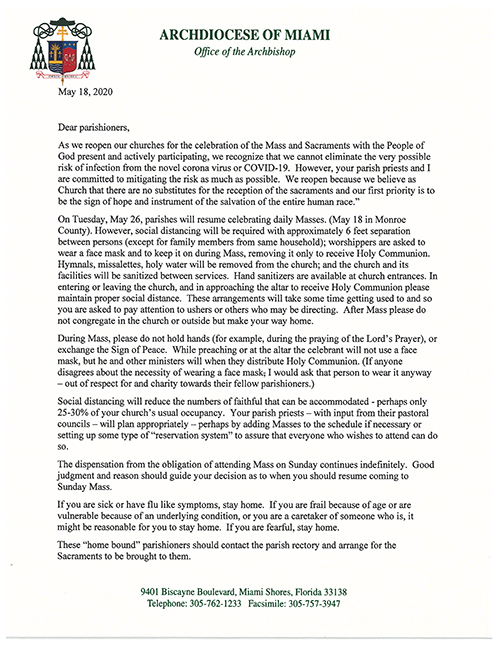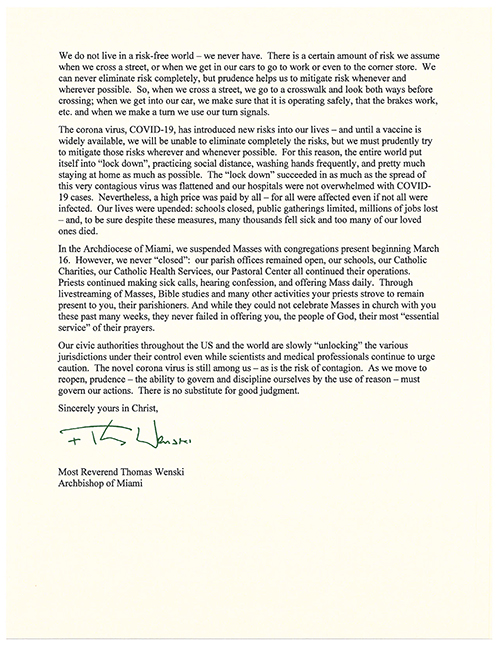By Ana Rodriguez Soto - The Archdiocese of Miami


Image of Archbishop Thomas Wenski's letter to parishioners regarding the resumption of Masses with the congregation in Miami-Dade and Broward counties, effective May 26, 2020. Parishes in the Keys were given the go-ahead to resume public Masses as of May 18, 2020. Click on the link in the story to read the archbishop's letter.
Editor's note: As more people begin to return to Mass, here's a reminder of the rules to be followed for doing so at all archdiocesan churches. This article was originally posted May 18, 2020.
MIAMI | After giving permission for churches in the Keys to resume the public celebration of Masses effective May 18, 2020, Archbishop Thomas Wenski has told pastors in Miami-Dade and Broward counties that they can resume public Masses beginning May 26 — the Tuesday after Memorial Day.
The first Sunday Masses with congregations will be celebrated Pentecost Sunday, the weekend of May 30-31.
There will be some restrictions for Mass-goers, however, so livestream Masses will continue for the foreseeable future. The dispensation from the obligation to attend Sunday Mass remains in effect “indefinitely,” the archbishop wrote in a letter to parishioners dated May 18, 2020.
Those who are elderly, sick, or have underlying conditions that put them at high risk for complications from the coronavirus, as well as their caregivers, are urged to continue taking part in the Mass from the safety of their homes. The archbishop said they should “contact the parish rectory and arrange for the sacraments to be brought to them.”
The restrictions for Mass-goers were outlined by the archbishop in his letter to the faithful and in a separate message to priests. These include:
- All worshipers need to wear face masks and remove them only when receiving Communion. Priests, deacons and extraordinary ministers of holy Communion will wear face masks while distributing Communion but not while they are at the altar or preaching.
- Capacity in the churches is based on social/physical distancing of six feet per person/family or approximately 25-30% of normal capacity. Pastors may schedule additional Masses, have overflow rooms or create some kind of “reservation system” to accommodate those who want to come to Mass.
- Social or physical distancing also will be observed while entering and leaving the church and lining up for Communion.
- Communion will not be given under both species; only under the form of bread. “I am not mandating Communion only in the hand — as Communion on the tongue if done properly doesn’t involve touching the communicant or his/her tongue,” the archbishop told his priests.
- The faithful are not to hold hands while reciting the Lord’s Prayer, nor will they exchange the Sign of Peace.
- There will be no offertory procession with gifts; no holy water at the entrances; and offertory baskets will not be passed around.
- Hymnals and missalettes will not be provided. Parishioners can bring their own or access Scripture readings by an app.
- Hand sanitizers should be available at church entrances and church surfaces (including pews, door handles and bathrooms) should be wiped down with disinfectant between Masses.
- Other parish activities and meetings (other than virtual meetings) remain suspended.
“These arrangements will take some time getting used to and so you are asked to pay attention to ushers or others who may be directing,” the archbishop wrote in his letter to parishioners.
He also said that “if anyone disagrees about the necessity of wearing a face mask, I would ask that person to wear it anyway — out of respect for and charity towards their fellow parishioners.”
The archbishop noted that “we do not live in a risk-free world,” as risk exists in every human activity.
“But prudence helps us to mitigate risk whenever and wherever possible,” he said. “The coronavirus, COVID-19, has introduced new risk into our lives — and until a vaccine is widely available, we will be unable to eliminate completely the risks, but we must prudently try to mitigate those risks wherever and whenever possible.”
He reminded South Florida Catholics that although Masses with the congregation have been suspended since March 16, 2020, “we never ‘closed’: our parish offices remained open, our schools, our Catholic Charities, our Catholic Health Services, our Pastoral Center all continued their operations.”
Priests also continued making sick calls, hearing confessions, offering daily Mass and reaching out to their parishioners through the internet and whatever other technological means were available.
“And while they could not celebrate Masses in church with you these past many weeks, (your priests) never failed in offering you, the people of God, their most ‘essential service’ of their prayers,” the archbishop wrote.
Though the resumption of public Masses is great news, he added a word of caution, telling his priests to have a plan B “if you should get sick, display some symptoms or have to isolate because you have the virus.”
He cited a Catholic parish in Houston, Texas, that had to suspend Masses two weeks after reopening because three of their priests tested positive for the virus — although all were asymptomatic. The parish had to ask anyone attending Masses to monitor their health and be tested for COVID-19.
In his letter to parishioners, the archbishop concluded: “The novel coronavirus is still among us — as is the risk of contagion. As we move to reopen, prudence — the ability to govern and discipline ourselves by the use of reason — must govern our actions. There is no substitute for good judgment.”


Comments from readers